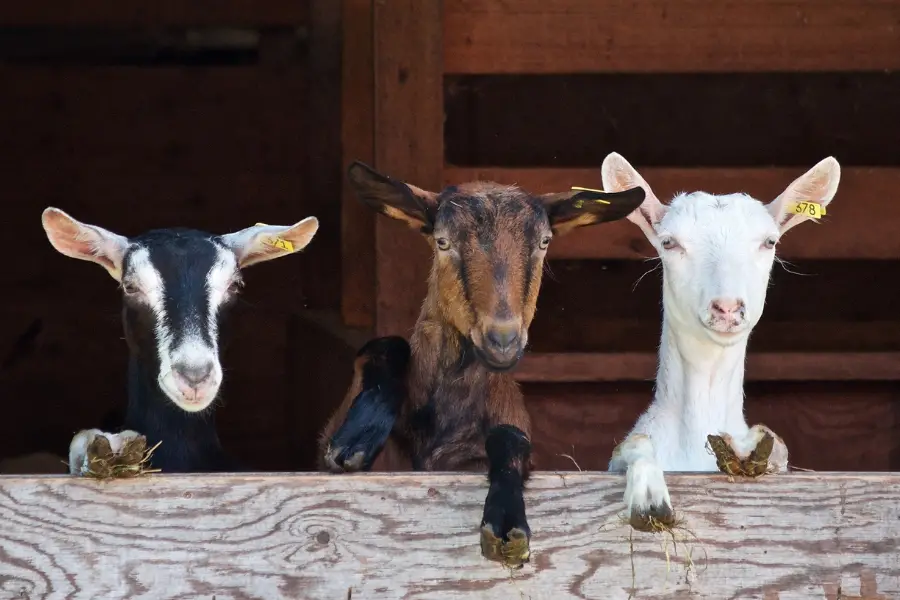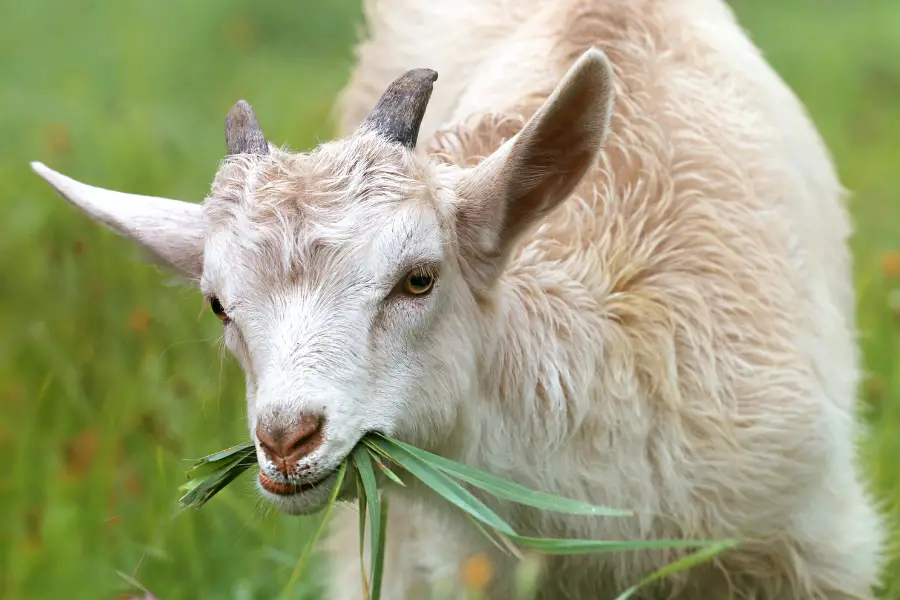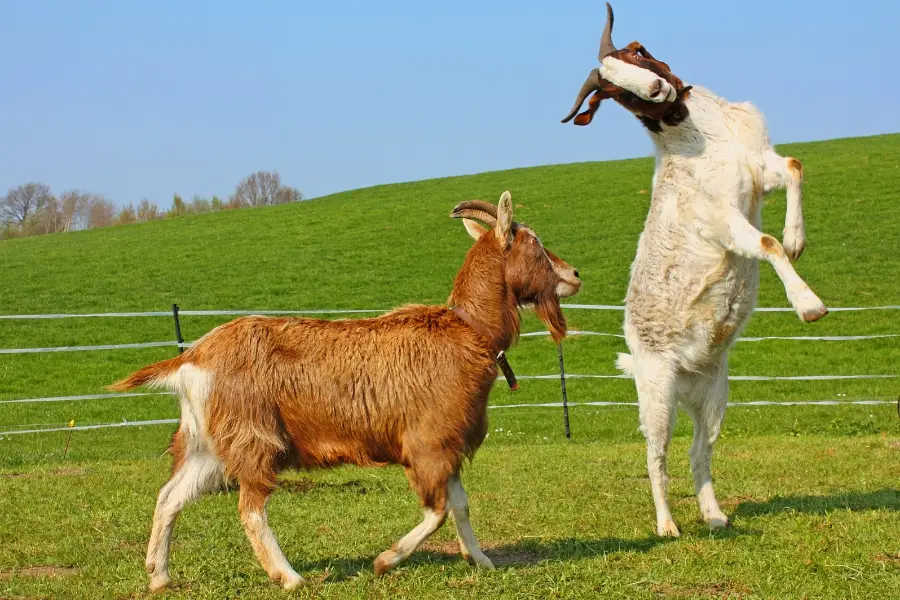Wether goats, castrated male goats that lack the strong musky odor of uncastrated bucks, are not a goat breed! This article will uncover everything about wether goats and showcase their benefits compared to bucks, which are non-castrated male goats.
Ready? Let’s dive in and discover why wether goats could make an exceptional addition to your family or farm!
Key Takeaways
- Wether goats are castrated male goats that have numerous benefits compared to bucks. They exhibit less aggression and do not have hormonal ruts or strong musky smells.
- Wethers make life easier with their simple living arrangements. They can stay with does all year round without the risk of unintentional breeding.
- Owning wether goats offers several advantages, including their long lifespan, low maintenance requirements, suitability for training and community outreach programs, efficiency in clearing brush and debris, suitability for meat production, and their ability to be loving pets or reliable pack animals on outdoor adventures.
Table of contents
- Key Takeaways
- Understanding Wether Goats: A Brief Overview
- Key Differences Between Wether Goats and Bucks
- Benefits of Owning Wether Goats
- Video: Why Wether Goats?
- Wether Goats as Pack Animals
- Video: Wether Goats In A Winter Herd
- Conclusion
-
FAQs
- 1. What are some benefits of owning a Wether goat?
- 2. Can Wethers help in lawn mowing and removing brush among other things?
- 3. How do I care for my Wether Goat?
- 4. Are there any unique activities I can do with my wether?
- 5. How does having a wether benefit other goats and farm animals?
- 6. Can owning a wether goat help kids learn about rural living?

Understanding Wether Goats: A Brief Overview
Wether goats, which are castrated male goats or bucklings, present an interesting addition to any homestead. These neutered goats can’t breed or produce milk like does and bucks but surprise everyone with their unique benefits.
Unlike other members of the goat family, wethers exhibit less aggressive behavior and possess a sweet disposition that makes them much easier to handle.
With no hormonal ruts to concern about, they do not have those strong odors associated with intact bucks who engage in urine spraying due to scent glands during breeding season. Thanks to this lack of unwanted smells, the living arrangements for wether goats become extremely simple.
They can comfortably remain with both bucks and does throughout the year without worry of unintentional breeding — a quality that is highly appreciated in maintaining an organized goat breeding schedule.
Key Differences Between Wether Goats and Bucks
Less Aggression
Wether goats show less anger than bucks. They are sweet and laid-back. They do not fight as much as bucks do. Bucks can get angry when their body changes due to hormones. But wethers don’t have those hormones, so they don’t get angry like that.
Being calm helps wethers be good for the herd. They stop fights and keep young ones safe. This shows they are not mean or quick to fight, unlike some bucks. Their quiet nature also makes them easy to care for on your farm or homestead.
Absence of Hormonal Ruts and Smells
Bucks can smell strong because of hormones. Wether goats do not. They don’t have the musky odor that bucks do. This makes wethers easy to be around. Bucks can also act mean due to hormones changes, but not wethers! These neutered goats stay calm and kind all year round.
You won’t have to keep them away from does, like you would with a buck.
Simple Living Arrangements
Wether goats make life easy with their living needs. They can stay with does all year round. This cuts out the need for separate spaces or moving them around a lot. It also stops any chances of unwanted breeding happening.
There are no strong musky smells from wether goats unlike bucks. This means your home stays fresh and pleasant. Their sweet and calm nature makes them good to have around too, unlike bucks that may act up at times due to hormones.
Benefits of Owning Wether Goats
Owning wether goats offers numerous benefits, including their long lifespan, low maintenance requirements, and suitability as both meat producers and loving pets. Read on to discover why wether goats are an excellent addition to any homestead or community outreach program.
Video: Why Wether Goats?
Long Lifespan
Wether goats have a long lifespan, often living up to 16 years. This is longer than both does and bucks, making them great companions for many years. With proper care and attention, wether goats can be a part of your homestead or farm for a significant amount of time.
Their longevity allows you to enjoy their company and benefit from their various uses, whether it’s training, community outreach, brush removal, meat production, or simply having them as loving pets.
Wether goats are resilient animals that will bring joy to your life for many years to come.
Low Maintenance
Wether goats are known for being low maintenance, making them a great choice for those looking for an easy-to-care-for animal. They don’t require as much attention and upkeep as bucks or does.
Wethers don’t have the same hormonal needs or behaviors that can make raising bucks more challenging. They also don’t have the strong musky odor that is often associated with male goats.
With their calm and friendly nature, wethers are easily handled and enjoyable to be around, making them a stress-free addition to any homestead or farm.
Good for Training and Community Outreach
Wether goats are excellent choices for training programs and community outreach. Their friendly and calm nature makes them easy to handle, making them ideal for interactive activities with people of all ages.
These goats can be trained to do various tricks and tasks, such as jumping through hoops or pulling carts. They can also participate in therapy programs, providing comfort and companionship to those in need.
Wether goats are sure to bring joy and educational experiences to any community event or program they are a part of.
Efficient in Removing Brush and Other Debris
Wether goats are highly efficient at clearing brush and debris. They have a natural instinct to graze on vegetation, making them ideal for keeping overgrown shrubs and other vegetation in check.
Their ability to navigate uneven terrain makes them effective in reaching areas that machinery or humans may struggle with. Wether goats can help maintain the appearance of your property while also providing a cost-effective and eco-friendly solution to managing overgrowth.
Ideal for Meat Production
Wether goats are the ideal choice for meat production. Since they are castrated males, they don’t have the strong smell associated with uncastrated bucks, making them more pleasant to be around.
Some breeds of wethered goats, such as Toggenburg and Kiko goats, are specifically bred for their meat production qualities. This makes them highly valuable in homesteading settings where raising livestock for food is important.
Whether you’re looking to provide your family with fresh meat or even sell it commercially, wether goats are a great option because of their suitability for meat production.
Suitable as Loving Pets
Wether goats are castrated male goats that make wonderful and affectionate pets. Unlike bucks, they don’t have aggressive behavior or a strong musky smell. Wether goats are quiet and low maintenance, making them great companions for any household.
They also have a talent for diffusing arguments within the herd and protecting younger goats. Wether goats love to cuddle with their owners and provide lots of affection.
Wether Goats as Pack Animals
Wether goats are not only great companions, but they can also be excellent pack animals. They have the strength and endurance to carry supplies on hikes, covering distances of up to 12 miles a day.
These sturdy goats can handle a pack weighing up to 25% of their body weight without any issues.
One of the reasons wether goats make good pack animals is their easy trainability. With patience and consistency, you can teach them how to wear a harness and walk alongside you with a load on their back.
Plus, wethers are known for their loyalty towards their human companions, which makes them reliable partners on long treks or camping trips.
Another advantage is that wether goats are generally calm and well-behaved, making them suitable for packing activities. Their docile nature means they’re less likely to get spooked or act out in stressful situations.
So whether you’re planning an outdoor adventure or need some extra help carrying supplies in rugged terrains, consider getting a wether goat as your trusty pack animal!
Video: Wether Goats In A Winter Herd
Conclusion
In conclusion, owning wether goats can be incredibly beneficial. They are friendly and gentle companions, with a long lifespan that brings years of joy to your homestead. Whether you need help with brush removal or want a loving pet, wether goats are the perfect choice for their low maintenance and easy trainability.
So consider adding these wonderful animals to your farm and enjoy all the advantages they bring!
FAQs
1. What are some benefits of owning a Wether goat?
Owning a Wether can be fun and affordable. They serve as herd leaders and peacemakers, making them great for 4-H projects or petting farms.
2. Can Wethers help in lawn mowing and removing brush among other things?
Yes! Wethers are known to eat grass and remove brush – they’re like living lawn mowers!
3. How do I care for my Wether Goat?
Caring for your goat involves proper feeding, regular hoof trimming, and providing a safe enclosure. You will NOT have to worry about rutting, strong smells, and accidental breeding.
4. Are there any unique activities I can do with my wether?
Wethers make loyal companions suitable for petting. You might even train them to participate in cart pulling or lead the pack at an American Goat Society show!
5. How does having a wether benefit other goats and farm animals?
As herd peacemakers, wethers create harmony within mixed groups of farm animals such as sheep and pygmy goats.
6. Can owning a wether goat help kids learn about rural living?
Absolutely! Kids can become comfortable handling a wether goat without worrying about aggressive behavior or strong odors



